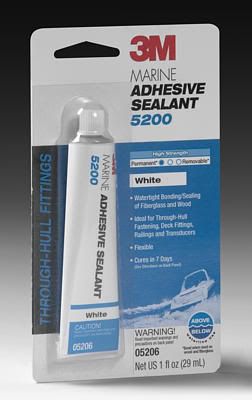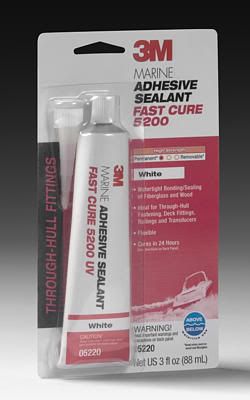
 |
|
|
#1 |
|
Member
Join Date: Feb 2011
Posts: 85
|
Marine glue

|
|
|

|
|
|
#2 |
|
Senior Member
Join Date: Sep 2005
Posts: 1,922
|
3M 5200 fast cure. Wear gloves.
|
|
|

|
|
|
#3 |
|
Senior Member
Join Date: Mar 2010
Location: San Diego
Posts: 2,385
|
I am a big fan of Marine Goop, OEX has it. I've searched Home Depot, Dixiline, and Lowes and none of the others have it. Steve, is 3M 5200 better? I'd be willing to try that also.
|
|
|

|
|
|
#4 |
|
Senior Member
Join Date: Jun 2010
Location: Alhambra
Posts: 506
|
i have also found marine goop at true value hardware stores and west marine. it is something that is not found in every hardware stores; go figure

|
|
|

|
|
|
#5 |
|
Senior Member
Join Date: Feb 2011
Location: Carlsbad
Posts: 143
|
This last week I installed a FF using 3M 5200 and was really surprised that it has taken 5 full days to set. The 5200 was still tacky as of yesterday afternoon and I put it on last Thursday. I'm hoping that it will be completely cured by this evening so that I can put the kayak in it's rack. The label says it should cure in 24 hours but it was still just goo. This is after I dragged the kayak into the yard Saturday so it would get air, and then when I moved it (delicately) back into the garage that evening I put a fan blowing air through it (just in case this was an issue with circulation). This was a sponge mount cut-away method for the transducer thru-hull.
I used 5200 on a Prowler 13 FF install a few years back and don't remember it taking this long. |
|
|

|
|
|
#6 |
|
TB Metal Art
Join Date: Jul 2010
Location: San Diego
Posts: 653
|
West Marine carries an epoxy that is made for polyethylene repairs but it does require that you heat treat the surface. I just used this to put in an automati bilge pump made by Whale. Cost 20$ but get about a large syringe full (2 parts). Yellow and white package. Just my2cents
|
|
|

|
|
|
#7 |
|
Currently @ MLO Territory
Join Date: Dec 2010
Location: Under the Shadow
Posts: 2,290
|
Have OEX do it, or else you will sink your new boat.
|
|
|

|
|
|
#8 |
|
Senior Member
Join Date: Mar 2010
Location: San Diego
Posts: 2,385
|
|
|
|

|
|
|
#9 | |
|
Senior Member
Join Date: Sep 2005
Posts: 1,922
|
Quote:
I like Goop for pretty much everything. Its easy to use, its is temperature resistant, inexpensive, its tensile strength is waaaay higher than the 5200 (3500 psi vs 600 psi) and it stretches 600% when cured, with is perfect for kayaks which flex and expand and contract all day. There are pretty much only 2 formulas for Goop. The ones with a UV inhibitor, and those without. While you may not be able to find Marine Goop @ Every home Depot or Lowes, they all usually carry a UV resistant formula of Goop- Lawn and Garden usually. However, I think its way cooler to support the local guys. Price is good too. http://www.kayakfishingsupplies.com/...ne-GOOP/Detail If you want something that specifically says "For use on through hull connections below the water line", 5200 is for you. I've done through hull pumps with both Goop, and the 5200, and I've never had a single drop leak with either. Prep is key for both. Sanding the area you are working on with a coarse grit sandpaper will be sufficient. Some yaks will require more sanding than others, because they have an agent left on them that help release them from the molds they are made on. Just make sure it feels rough, and you'll be fine. I've had to sell several yaks with the transducer still installed because I literally could not remove it from the goop on the yak. The plastic of the yak was breaking before the goop was giving. I wouldn't use any hard epoxies on a yak. They move too much, and anything brittle will fail over time. Keep in mind. The threads of the pump and connection are actually making the compression of the connection and holding everything together, the Goop or 5200 is just there to seal the small stuff. Measure 2X, cut once is very important. Make sure you have a snug fit, especially for something below the waterline. I'm pretty sure my through hull 'ducer would be bone dry, even without the 5200 globed all over it. With all this in mind, If in doubt, let the Pro's @ OEX do it. You don't want to have even a little bit of doubt about the safety of your yak when you are a few miles out. If you are new to this game, I'd especially recommend taking it in to the guys @ OEX to have it done right the first time. Geez, did I just write all that? Fook, its time to go fishing! 
|
|
|
|

|
|
|
#10 |
|
Senior Member
Join Date: Apr 2010
Location: garden grove
Posts: 308
|
i use plumbers goop from home depot.works good and inexpensive
|
|
|

|
|
|
#11 |
|
Senior Member
Join Date: Jun 2008
Posts: 552
|
3M 5200 is specifically intended for marine applications, it's the traditional go to in the yachting community, sticks to almost anything, is completely waterproof, and stands the test of time.
|
|
|

|
|
|
#12 |
|
Member
Join Date: Jun 2007
Location: Rancho Cucamonga
Posts: 33
|
pump
Make sure you cut the pump shaft short enough that the strainer doesn't bottom out. Use marine goop to fill the recessed area of the strainer it will not leak.
|
|
|

|
|
|
#13 |
|
.......
Join Date: Jan 2009
Posts: 1,509
|
|
|
|

|
|
|
#14 | |
|
Senior Member
Join Date: Mar 2010
Location: San Diego
Posts: 2,385
|
Quote:
|
|
|
|

|
|
|
#15 |
|
Senior Member
Join Date: Feb 2011
Location: Carlsbad
Posts: 143
|
|
|
|

|
|
|
#16 | |
|
Senior Member
Join Date: Sep 2005
Posts: 1,922
|
Quote:
It may be possible that you have the slow cure version, or you allowed alcohol/acetone or another solvent to come in contact with the 5200, which will inhibit curing. Did you clean the area you were using it on with any solvents? If not, check the color of your 5200 label. Red = Fast, Blue = Slow. 3M™ Marine Adhesive/Sealant 5200 This high-performance polyurethane adhesive/sealant becomes tack free in 48 hours, completely cures in 5-7 days with no shrinkage.  3M™ Marine Adhesive/Sealant Fast Cure 5200 This high-performance polyurethane becomes tack free in one hour and fully cures in approximately 24 hours.  Slower cure has higher bonding strength, but not by a huge amount. Both versions aren't really recommended for plastics, and have relatively poor bonding strength to most plastics. But, in most yak applications the 5200 is being used as a sealant, and not a true adhesive, so its not that big a deal in the grand scheme of things. Especially since the areas we seal below the waterline on kayaks are only a few inches deep, so the water pressure isn't that great to begin with. Potato, Potahtoe. |
|
|
|

|
|
|
#17 |
|
.......
Join Date: Jan 2009
Posts: 1,509
|
That's interesting it used to be that the faster cure was considered a different product.
 I wonder if there is any difference between 4200 fast and 5200 fast? Personally I've only used the original 5200 and the faster 4200, but I have used a lot of it in marine applications like thru-hulls for large boats. 4200 hundred dries is faster, and is sticky stuff, we used it mainly for caulking above water seams, windows, trim, etc... but the original 5200 definitely sticks better once it completely cures, and we used that mostly for below the water line applications like through hulls. Keep in mind that when you use it on big boats the boat is often only out of the water (hauled out) for a few days so even if it's not fully cured on jobs like tru-hulls it does seal in a relatively short period of time, and continues to cure even if in the water. As to adhesion. I've ripped sections of fiberglass right off a hull trying to get things stuck with 5200 off fiberglass. Once it sticks it sticks good. Jim Last edited by Fiskadoro; 02-15-2011 at 09:43 AM. |
|
|

|
|
|
#18 |
|
Senior Member
Join Date: Feb 2011
Location: Carlsbad
Posts: 143
|
I scrubbed the area with light grit sandpaper and then wiped it with a small amount of acetone and paper towel. The acetone was long gone before I applied a sponge with cutaway shape for transX. When I filled the cavity with the 5200 it was easy to set in the puck and push it down firm.
I'm pretty sure this is the slow cure but the back of the label says that it sets in 24 hours? It's the marine stuff for sure. The lack of airflow, colder temps and sponge border could all be factors. The weird part was that even the goo on the top edges where it squeezed up was tacky as of Sunday (4 days). Seems to me that would be the first part to harden. I'd just advise guys to plan on leaving 5200 adhesive items alone for 4 or 5 days at least. No point in risking your hard work! Last edited by onetriphudson; 02-15-2011 at 11:14 AM. |
|
|

|
|
|
#19 | |
|
Senior Member
Join Date: Sep 2005
Posts: 1,922
|
Quote:
Tensile strength for the 3M 4200 is 300 PSI, the 5200 fast cure is 600 PSI, the 5200 slow cure is 700 PSI. All those numbers are for adhesion under ideal conditions. On gelcoat the 5200 tensile strength is 519 PSI, and for adhesion to polyethylene that number drops down to 48 PSI. The Marine Goop tensile strength starts around 3800 PSI under ideal conditions, and is at about 1700 PSI on some plastics. Much stronger that the 5200, but all of this is still ridiculous overkill for the sealant properties that we actualy use them for. |
|
|
|

|
|
|
#20 |
|
Member
Join Date: Feb 2011
Posts: 85
|
thanks everyone for your suggestions. I think I'm going to take it to OEX.
|
|
|

|
 |
|
|